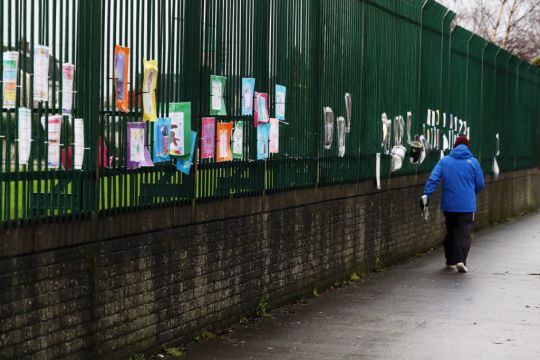All primary and fifth year students will return to school next week, the Department of Education has said.
The department confirmed that it will move to the next phase in the reopening of schools as planned next Monday.
The decision comes after it was given the green light by the Department of Health and the HSE.
The partial reopening of schools began last week when younger primary classes and Leaving Certificate students returned to the classroom.
1. The Department of Health and the HSE have reaffirmed that the gradual phased reopening of schools can proceed as planned.
The next phase of return is on Monday March 15 for all primary school children in 3rd to 6th class and 5th years in post primary schools.Advertisement— Norma Foley T.D (@NormaFoleyTD1) March 8, 2021
Around 100,000 children also returned to preschool on Monday morning.
It is part of a plan to have preschool children return over a period of three weeks.
In a statement, a spokesman for the department said: “The Department of Education has today confirmed that the second stage of the phased return to schools will commence on Monday 15 March.
“The Department of Health and the HSE have reaffirmed that the gradual phased reopening of schools can proceed as planned.
“The next phase of return is on Monday March 15 for all primary school children in 3rd to 6th class and 5th years in post-primary schools.
“Public health has reviewed the measures put in place to ensure safe operation of schools and is satisfied that these infection prevention and control measures, if rigorously adhered to, will keep the school community safe during this period.”
Meanwhile, the number of cases of Covid-19 in long-term residential care settings has decreased rapidly over recent weeks, deputy chief medical officer Dr Ronan Glynn has said.
The public health doctor said that the number of cases dropped more than he expected, given the level of disease in the community.
2. Public health has reviewed the measures put in place to ensure safe operation of schools and is satisfied that these infection prevention and control measures, if rigorously adhered to, will keep the school community safe during this period.
— Norma Foley T.D (@NormaFoleyTD1) March 8, 2021
In a letter to the Department of Health sent last week, Dr Glynn said that the epidemiological situation in Ireland was improving but remained “very finely balanced”.
The National Public Health Emergency Team (Nphet) said that while indicators of mobility across the population were low, they continued to drift upwards.
“This is a cause for concern,” Dr Glynn said.
“While we are seeing continued, slower yet constant progress against all indicators of the disease, incidence remains high. Community test positivity remains high but appears to be reducing.
“Health and social care services continue to experience significant pressure from the current wave of infection.
“The number of confirmed cases in hospital and in ICU is still high but continues to reduce.
“The number of cases in long-term residential care settings has decreased rapidly over weeks, more so than would have been expected given the level of disease in the community.
“Deaths associated with these outbreaks in these settings also appear to be decreasing, with trends supporting the emerging evidence of the protective effect of vaccination.”
Dr Glynn said there had been some recent increase in the average number of close contacts per adult confirmed case, but that it remained stable at 2.6.
“We are maintaining a steady suppression of transmission,” he added.
Nphet said that the community test positivity rate had decreased over the past week.
It said the rate remained high at 13 per cent over the seven days leading up to March 2nd, which compared to 15 per cent on February 23rd.
There were 715 people who died from Covid-19 in February. This is compared to 1,314 deaths in January and 196 deaths in December.
Of the 715 deaths in February, 95 were associated with hospital outbreaks and 273 were associated with nursing home outbreaks.
There were 419 people with Covid-19 in hospital as of Monday morning, with 103 patients in ICU.
Up to 84,000 vaccines are to be delivered this week, with some 37,000 over-70s to receive their first dose of the vaccine.
Around 10,000 people with underlying conditions aged between 16 and 69 will also receive their first dose this week.
The Cohort 4 group includes people aged 16 to 69 with a medical condition that puts them at very high risk of severe disease and death.







